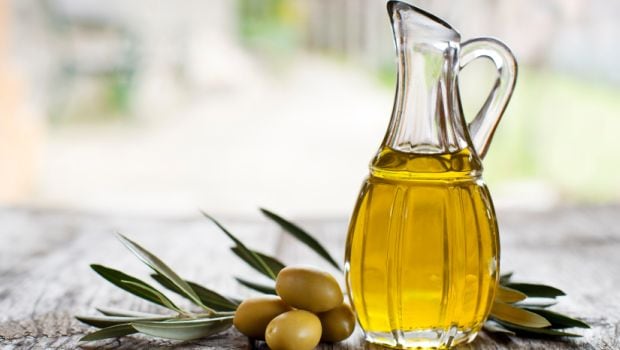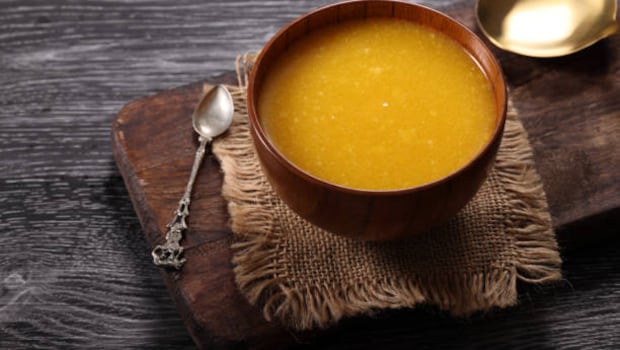In most Indian households, the debate between ghee and olive oil is no less dramatic than a family soap opera. On one side sits maa, who insists that “thoda ghee roti pe lagana hi chahiye.” On the other side is the younger generation, who swear by a drizzle of olive oil because their favourite nutritionist said it is a “healthy fat.” Both camps are convinced they are right. But when your aim is to trim belly fat, the argument gets serious. Do you stick to the golden spoon of ghee that Ayurveda has backed for centuries, or side with the olive oil bottle that has become a global health symbol? Let us unpack the science and the culture behind both.
Also Read: Still Struggling With Belly Fat? This Morning Drink Might Be Your Missing Piece
Do Healthy Fats Really Help You Burn Fat?

Not all fats are villains. Some are surprisingly good allies in your weight loss story. According to a 2022 research paper, fats from avocados, nuts, and olive oil can keep you full for longer, calm inflammation, and regulate hormones. All of this helps your metabolism work better.
But here is the catch: too much of even the healthiest fat can slow your progress. So the question is not just what fat you eat, but also how much.
Ghee vs Olive Oil: Nutritional Face-Off
Before we get to the benefits, let us check the numbers:
Calories (per tablespoon): Ghee = 112 | Olive oil = 119
Fat type: Ghee is high in saturated fats | Olive oil is rich in monounsaturated fats
Nutrients: Ghee provides vitamins A, D, E, K | Olive oil offers antioxidants and vitamin E
Smoke point: Ghee is great for high-heat cooking | Olive oil works better for medium heat and raw dishes
The numbers show both shine in different ways, but belly fat reduction is where the real contest begins.
Is Ghee Good for Losing Belly Fat?

For centuries, ghee has been more than an ingredient—it has been a symbol of nourishment. From khichdi to chapati, ghee makes meals taste wholesome and comforting. Ayurveda praises it for supporting digestion and energy. Science agrees with some of that.
A 2014 study suggested that ghee's saturated fats increase satiety, so you are less likely to overeat.
Butyric acid in ghee supports gut health, which plays a role in weight management, according to a 2020 paper.
The downside is that ghee is calorie-heavy, so portion control is crucial. A teaspoon or two is enough.
So yes, ghee can support belly fat reduction, but only when used mindfully.
Can Olive Oil Help Reduce Belly Fat?

Olive oil is the hero of the Mediterranean diet, which is linked with longer life and lower obesity rates. It owes much of its fame to monounsaturated fats, which help the body metabolise fat more efficiently.
Antioxidants in olive oil reduce inflammation, which is tied to fat storage.
Its healthy fats improve satiety without piling on excess calories.
It works best drizzled on salads, soups, or sauteed vegetables—not for deep frying.
A 2018 research paper linked olive oil to reduced belly fat accumulation. When used regularly, it supports both heart health and weight control.
Ghee vs Olive Oil: Which Is Better for Belly Fat?

So, who wins the belly fat battle?
Ghee: Great for flavour and traditional cooking, supports digestion, but must be limited due to saturated fat.
Olive oil: Rich in monounsaturated fats and antioxidants, making it more effective in reducing fat storage.
If belly fat reduction is your priority, olive oil has the upper hand. But in reality, the smartest approach is not about choosing sides - it is about balance. Use ghee when you need that desi comfort, and olive oil when you want something lighter.
How To Use Ghee for Weight Loss

Here is how you can enjoy ghee without guilt:
Add one teaspoon to dal, khichdi, or chapati.
Use a small amount for tempering instead of heavy frying.
Skip ghee on foods that are already oily or fried.
How to Use Olive Oil for Weight Loss

Olive oil can slip into your diet quite easily:
Drizzle over roasted vegetables, soups, or salads.
Use in light stir-fries or sauteed dishes.
Mix into dips or dressings instead of heavy mayonnaise.
Best Time to Consume Ghee and Olive Oil
Timing matters. Fats are best eaten when your body is active and needs energy. A spoon of ghee at lunch or olive oil in a dinner salad can boost satiety and stop late-night snacking.
Large portions late at night, however, may add to fat storage. Consistency and moderation matter more than timing, but daytime use is generally more supportive of weight management.
Also Read: 5 Morning Rituals To Kick-Start Weight Loss Journey And Cut Belly Fat
Final Word: Balance Is the Real Secret
So, what should you pick? If your goal is strictly belly fat, olive oil may give you better results. But if you want a sustainable approach that blends tradition with modern health, use both wisely. The smartest plate is the one that holds a spoon of maa's ghee and a drizzle of olive oil—because health is not about extremes, it is about balance.
Disclaimer: This content including advice provides generic information only. It is in no way a substitute for qualified medical opinion. Always consult a specialist or your doctor for more information. NDTV does not claim responsibility for this information.
About Nikita NikhilMeet Nikita, a passionate soul with an insatiable love for two things in life: Bollywood and food! When she's not indulging in binge-watching sessions, Nikita can be found behind the lens capturing moments or expressing her creativity through painting.









